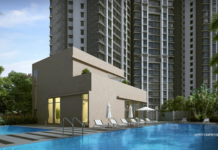By Mr. Jayant Vaitha, Director, Synergy Property Development Services
New Delhi, April 18, 2018: Architecture plays an important role for populace to own dream home, create & manifest inspirational work spaces, cherish a lifestyle in proficient district and many more. Off-late, post the New-Classical and Blobitecture era, the architecture industry is undergoing various changes at a great pace co-relating to the changing lifestyle and facilities that define our life today. It has become more organized, technologically advanced and the work qualities of each professional are on par with each other globally. Architecture is often socio politically motivated and is mirror for the development a state goes through.
There are abundant innovations happening every moment and are being adopted aggressively as trends in architecture. More importantly, the target audience is now well aware and is often looking for designs on par of global standards. The recent phenomenon of adopting and using cutting-edge building technologies are slowly digesting conventional construction technologies. The way buildings are envisioned and realised, introduces an entirely new chapter into the construction industry, bringing in a major social and cultural shift.
Read on as Mr. Jayant Vaitha, Director, Synergy Property Development Services, elaborates on few emerging trends in Architecture and design for projects in 2018:
- Multidisciplinary Collaborations
Architecture shall no more be a single professional’s board, but it shall become a by-product of multiple professional whizzes like product-designers, environmentalists, psychologists, sociologists, anthropologist etc. It is highly competitive and multi-disciplinary profession, involving a variety of tasks covering innumerable disciplines, including spatial design, aesthetics, energy accountancy, psychological impulse, project management and material management. The demand for socio-conscious architecture is increasing & the involvement of social experts has turned inventible.
With more strategic work and a large workforce involved in architecture and design, the onus is on architects and designers to give an amusing yet workable shape to the buildings. Interestingly Architects form the majority of all the design professionals working in India. As per a survey of CII, out of the total number of designers working in India, architecture accounts for the most with 81.25%.
- Virtual Reality & Immersive Architecture
The world of 3D virtual design and engineering is a fast growing field and there’s some seriously headlong thinking happening in these fields. Every design will soon be made using virtual reality; enabling the user to fully immerse himself in true scale 3D BIM models. The model would serve an incredibly accurate sense of presence in a space that’s yet to be built. This will be a step closer towards the understanding of the designed spaces.
- Building information Model
It’s been quite some times since when BIM exploded the crust of conventional design and construction technologies. The BIM is already an old idea, but it has started to build massive momentum in the architectural community. The BIM (Building Information Model) is based on several principles that can be implemented with relative independence. The classical understanding of BIM is merely limited to construction document and drawing production for architectural project. The implementation of BIM will give a new perspective to architecture. If whole city/ town is put at a platform of BIM, building services trouble-shooting shall become quite simplified for the detailed information availability pertaining to each streets, buildings and open spaces of the city. The effective use of BIM shall help us combat climate changes with climate responsive buildings. It shall also help in optimizing resource management and responding with brisk town/city planning solutions. Globally, first world countries have largely migrated to BIM successfully. We are very confident that India too will embrace BIM gradually but surely in projects, leading to accuracy and bringing value-addition.
- Big-Data & Smart Cities
Although Big Data has a lot of buzz around it, I believe that in many ways it is still a relatively new and unexplored concept. However, its potential for demographic and relative behavioral analysis is already obvious. In the time when the bureaucracy & government is crafting opportunity for smart city, Big-Data is a perfect and integral tool for its planning and creation. It shall help us optimize the resource utilization, a key factor towards making of a smart city.
- Architecture Robots & 3D Printers
The way we make things has changed — but will change more drastically still. Robotics is going to become a key stake holder of the construction industry. It won’t be long before we are assisting in designing to a construction process that involves assembly robots. Assisted robotics, in which a human and robot work together to direct the construction process, is also on the horizon.
We’ve seen 3D printing of consumer items, but new algorithms can actually value engineer a structure, while solving the equation for structural resilience and material use. In architecture, we have seen parametric design tools assist in creating amazing structures. Now the use of large-scale 3D printers will help push the materiality of those structures. 3D-printed construction will greatly expand the limits of construction technologies.
- Parametric Architecture
Parametric design is a generative design system, where adjusting the parameters will compute to create different types of outputs, and create forms and structures that would not have otherwise been possible. The use of parametric architecture shall open opportunity to devise climate responsive building forms based on the parameters like wind flow, solar gains, temperature differences etcetera. The upside-down model of church by Antonio Gaudi is one of the simplest example to understand parametric architecture. In his design for the Church of Colònia Güell he created a model of strings weighted down with birdshot to create complex vaulted ceilings and arches. By adjusting the position of the weights or the length of the strings he could alter the shape of each arch and also see how this change influenced the arches connected to it. He placed a mirror on the bottom of the model to see how it should look upside-down.
- Vertical Townships
The inversely proportional math amid land and population growth is a red flag for architect’s fascination towards horizontality. The scenario of day beckons the growth on Z-axis We need to look into reducing the horizontal footprint, by expanding towards the sky. With the emerging ideas like vertical farming and active revolution in vertical transportation systems the concept seems to be soon barging into the mainstream. Bombay is a classical case study to realize the assurgent need to adapt to the notion of getting a vertical growth. Negation of same is only a step towards annihilation.
- Sustainable and environment-friendly
The world has realized the nature’s alarm towards diminishing energy resources. And an assurgent need has arisen to build in way that we consume lesser energy and encourage alternative sources. The notion of creating ‘net-zero’ built spaces is becoming popular and soon we will have many built forms working on the very principle. The clients and building owners are now very well aware and appraised of the need towards attaining net-zero. They are going to play a crucial role in getting design done that way.
It will be wrong to say that sustainability is a contemporary word rather there has always been a need to find sustainability in construction by envisioning and realizing projects that comply with social, economic and ecological principles. It ensures that our actions and decisions, do not inhibit the opportunities of the coming generations.
One key aspect of architecture, which is coming up and expected to play an increasing role in architectural design is environmental friendly buildings and structures.
Environmental friendly architecture and green buildings are gaining popularity because of aspirations towards ‘net-zero’ built forms. Be it roofing and building materials, cabinets and counters, or even flooring, energy efficiency is the keyword here. The ideas are growing radical right from generation of electricity locally through hydro, solar systems to generating large ponds through rain water harvesting. We are further going to use ideas like Geothermal Systems to check the micro-climate conditioning. The use of recycled materials, like plastic, glass, reclaimed wood etcetera shall make path further simpler towards ‘Net-Zero’ Buildings, popularly called ‘Green-Buildings’.
Corporate Comm India(CCI Newswire)























